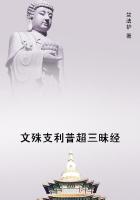But we must never forget the distinction between means and ends. The form of the law is the means, justice, however, the end. We may perceive that laws cannot do away with every immorality, cannot effect a strictly just distribution of incomes; that the ingenious tricks of astute and selfish business men flout all decency, and find ways to slip through the meshes of the best laws. But this must not restrain us from working for justice, and from faith in its victory. Although thousands of injustices are bound to occur in our life, our best possession rests on the idea of justice. All social progress depends on further victories of justice. By demanding a just distribution of incomes, socialism has introduced nothing new, but has in contrast to the errors which were created by materialistic epigones in a short period of so-called philosophy of enlightenment, only returned to the great traditions of all idealistic social philosophy. The error of socialism was simply that it overlooked the difference between material and formal justice, as well as the significance of other equally justified social ideal conceptions; that it imagined the individual conceptions of certain idealists of what is just, would suffice to overthrow suddenly and immediately primeval institutions. With its crude excrescences it returned to standards of justice which perhaps correspond to the first stages of civilization, certainly to rough views, but not to refined conceptions of higher morality.
Socialism can teach us not to demand a false justice; it should never hinder us from fighting for a true justice. History tells us that progress has usually been tedious; it shows us just as much that at length the greatest formal difficulties have been overcome; that especially in the great epochs of faith in ideals which rejuvenate and ennoble men, the juster right, the refined morals have triumphed over the powers of egoism, of sluggishness, of stupidity, and now better and juster institutions have grown up. There was a time when the demand for a just system of trade, which is universally conceded to-day, appeared as an ideal far in advance of the times. Robberies, thefts, frauds, brawls in the market-places, extortions of gifts were the older forms of transferring property. Here a thousand years' work in civilization has developed, in connection with the progress of reined conceptions of justice, the institutions of law, which to-day govern and bind all intercourse as a matter of course.
The leading conceptions in this work of civilization in the past and present do naturally not relate to the whole society and all its purposes, nor to all qualities of men. In every ordinary barter two persons, whose other qualities are not conceded in this relation, which is confined to this one barter, meet with the purpose of advancing their mutual interests by the exchange of certain goods. This result is reached if they exchange values essentially equal, if both sides make equal profits. "The giving and the taking," Herbart says, "everywhere presupposes compensation, i.e., equality of the given and the taken."Conceding the standards of equality only, can there be any dissent. The savage sees equality in purely external circumstances, in the fact that the furs just fill the kettle for which he trades them. The civilized man asks for equality of money value, the formalist for the equal absence of fraud, force and error. The principle however, always remains the same.
Equality measured in some way is required. And if the equality of both sides required by the conventional standard exists, justice is secured because the logical judgment and the moral test does not bring the single agreement into relation with the total distribution of incomes, with the total worthiness of the persons. Only a fool could require as a demand of justice, that the grocer grade the price of a pound of coffee according to the wealth of each customer, or that in a publishing contract the publisher should pay to the author of an unsalable scientific book a large sum because it is a work of great labor and skill.
The justice of a single bargain is the so-called exchanging justice, as Trendelenburg in his admirable essays on Aristotle has proved to be the real meaning of the great Stagaryte. This exchanging justice is nevertheless not in strict contrast to distributive justice; it is only one of its subdivisions, which concerts not the whole society and all its purposes, but simply a part of them and an especial purpose.
As long as the value of every good thing is a different one for each man, so long a certain inequality of profits will not seem unjust. Only when this equality oversteps certain bounds, when its cause is not the free decision of a free man, does a lively feeling of injustice arise and seek a legal remedy. For thousands of years the selfish impulses of those who in the social struggle of competition are the stronger; have demanded unconditional ******* of contract; and this demand is always opposed by public conscience and the demand of the weaker, which establishes the conception of justum pretium, which requires a governmental regulation of prices, statutes on usury, consideration for the "laesio enormis," public control of abuses in trade and traffic, a restriction of exploitation. This requirement disappears only when two real equals meet, who as a rule derive equal benefit from their commercial relations.















